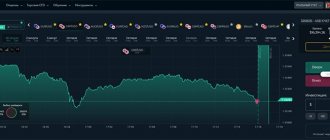Trading is , first of all, a business. But if for any other business emotional decisions are simply harmful, in trading they can even lead to disaster. Taking a closer look at the people who have achieved tangible success in this business, you will notice certain common mental personality traits that unite them all. A trader needs to develop certain personal qualities and a style of thinking that will allow him to remain calm and confident in his actions while trading. It is these personal qualities that we call “the psychology of a successful trader.”
The biggest obstacle on your path to success in your chosen business is not the market or the broker, but you yourself. And in the list of character traits that interfere with effective actions, excessive emotionality is not in last place.
A trading system alone is not enough, no matter how profitable it may initially be. You apply it, which means that working on your personality and psychological state during trading is very important.
If you are really determined to get a consistently profitable result in the long term, then take into account the following factors in trading that can significantly make it easier for you to solve this problem.
Know what you want in the end
You must be prepared for a wide variety of situations and emotions. This readiness allows for control. No one has yet managed to suppress emotions or completely get rid of them. This is unique to people with alexithymia, but is considered a psychological problem rather than a positive quality. Internal preparedness for stressful situations allows you to monitor and manage your emotions.
I really hope that you have already gotten rid of the illusion of getting rich quickly through trading and realized that losses are, although painful, still an inevitable part of business. There are both lucky streaks and periods when your trading results will be significantly worse than your original expectations. This is inevitable and we must learn to accept it. Don’t be afraid of losses; they are not evidence of “bad” trading. It is much more important to understand that “good” trading is not break-even trading at all, but systematic adherence to trading guidelines, strict adherence to the trading plan and system.
It is important to focus on the long term. Most traders evaluate their trading results every month, while it is much more effective to do this at least once a quarter. If you sum up the daily results, you can simply go crazy from stress.
That's why I suggest you set weekly goals (this is the shortest, but not desirable, acceptable time frame), and get out of your head the idea that one single day can define your trading.
Of course, no one likes losses, but when you trade, they are inevitable. The key is how you deal with them. Successful traders understand that there are no 100% deals and the market does not tolerate fuss. There is no need to rush to return what you lost; it is much more useful to first recover psychologically and only then return to trading.
Too many traders focus on short-term trading results and lose perspective. A short series of failures leads to a change in strategy, and this entails even greater psychological stress, reducing the effectiveness of decisions made. The result is new losses. And so on in a circle. The path to success is systematic and methodical work. Intraday trading requires concentration and thoughtfulness, the ability to make the right and accurate choices. It is important to focus on quality, not quantity of transactions, set long-term goals and systematically move towards them. This will ultimately lead to the desired consistently positive result.
Trading psychology: how we trade
When we talk about trading psychology, we usually mean a certain internal state that a trader needs to work effectively.
As well as his skill and ability to resist external stimuli, cope with a complex emotional state and stress, and withstand psychological stress. To be more precise, we most often talk about the following skills:
- The ability to manage your fear
- The ability to control your greed
- Strict adherence to discipline
How we trade
Trading is a very exciting activity. The only problem is that you can hardly feel excited and make money at the same time! Such trading is more reminiscent of a casino, where players simply have fun with free drinks, while a cold-blooded dealer calmly and with dignity empties their pockets.
And it should be noted that if such trading gives you pleasure and does not harm the financial situation of the family, then it has the right to exist. After all, there are male and female hobbies on which people are willing to spend very, very impressive amounts of money, without expecting a return at all. And trading as a hobby allows for such a possibility. After all, you can not only lose, but also win a certain amount by guessing the direction of market movement.
However, to achieve real success in trading, a fundamentally different approach is required. We often hear that for this we need to develop iron discipline . But without internal dialogue with oneself, awareness of one’s own problems, discipline turns from an assistant into a gendarme. It does not support us, but cruelly suppresses natural psychological reactions developed over the years of life. It is very difficult to constantly be in a state of internal contradiction with yourself, and suppressing natural impulses causes stress.
Psychological problems in trading and their possible causes:
- Fear of closing a stop loss position or fear of loss : the usual reason for this is that the trader is afraid of his own failure, and not of losing a certain, usually small and predetermined amount. He feels he cannot bear another loss. The trader's EGO is at risk;
- Exiting profitable trades too early: excessive emotional involvement, emotional dependence on the result. In this case, a strong anxiety arises, which is relieved when the position is closed. Fear of a market reversal against a position and, as a result, intolerance of feelings of disappointment. The need for instant gratification, getting what you want;
- Adding to a losing position (averaging) : unwillingness to admit that you may be wrong. Hope that the price will return and that the forecast of its movement will still be correct. And here again the trader’s EGO is affected;
- Dreams and hopes : “magical thinking”, refusal to take personal responsibility for the results of trading and control over it. Failure to accept the current market situation;
- Compulsive trading : strong emotional involvement in the trading process. In some cases, it may indicate a possible problem with gambling and alcohol. Such a trader experiences a strong, hard-to-bear desire to be in the market all the time;
- Excessive joy from a profitable transaction : may indicate that the trader’s self-esteem is directly related to trading results. Feeling of unreal “control” over the market;
- Profit limitation : feeling that success is undeserved. The internal belief that you don't deserve to be successful, have money, or make a profit. This is usually associated with low self-esteem;
- Not following a trading system : You don't actually believe it works. You haven't tested your trading system well enough. It may not suit your personality. You want more excitement in trading, more adrenaline. You don't trust your ability to choose a successful system;
- Rethinking trading signals at the last moment, trying to guess the direction of the market: fear of loss or error. The desire to be sure of something of which it is actually impossible to be sure. Failure to understand the very fact of the inevitability of loss, the fact that losses are part of trading and the result of each transaction is unknown in advance. Rejection of the fact that trading inherently involves risks. Fear of the unknown;
- Oversizing : baseless daydreams and dreams that trading will definitely be profitable. "Magical Thinking" The risk is not fully understood and there is no understanding of the importance of proper money management. Refusal to assume responsibility for risk management;
- Overtrading : the desire to “conquer” the market. Greed. An attempt to get even with the market for a previous loss. Excessive emotional involvement in the trading process (similar to compulsive trading);
- Fear of trading : there is no trading system, trading is carried out “for luck”. Poor risk tolerance and fear of the unknown. Fear of complete loss of all funds. Dependence on other people's opinions, fear of looking like a loser in the eyes of other people. The desire to control everything, including what is impossible to control by definition;
- Post-trading irritability : emotional swings caused by anger, fear and greed. Too much importance is attached to the results of trading, in contrast to the process, which seems difficult and exhausting. There is no professional development, mastering trading skills, studying markets and new trading tools. Too much emphasis is placed on money. Unrealistically high trading expectations. Lack of specific trading goals, lack of a financial plan;
- You can't afford to lose : your last hope for success. Trading with borrowed funds or family savings. Trying to be successful at something. Fear of losing your chance at opportunity. No discipline. Greed. Despair.
This does not mean that absolutely all psychological problems are listed on this list, but they are the most common and common, especially among novice traders. Typically, these problems are associated with the fact that for one reason or another the trader does not have an approach to trading that is clear to him. He does not have a clear trading system and does not adhere to a trading and financial plan. Such a trader trades in his hopes, illusions, dreams and fears. Over time, if the market does not “gobble up” such a trader, he will learn to solve these problems on his own. Most often, this takes 2-3 years.
When a person gains a certain experience, as a rule, this happens after 2-3 years of trading, then he already has psychological problems of a completely different kind. These are very specific and very individual problems related specifically to the personality of the trader himself. As you can see, psychology in trading is vital. But in this article we are talking more about psychological problems that arise during the period of professional development.
From a psychological point of view, your goal is to remain calm and even in your emotional state at all times. Your winning and losing trades should not upset your emotional balance. Of course, we all trade better when we are winning, but we must strive to maintain emotional balance regardless of any gains or losses.
Inability to accept loss
The first reason why traders lose money may seem obvious, but in fact, its roots lie in the deeply social and psychological attitudes of people. This is a psychological inability to accept loss. For a person, this is equal to failure, and, therefore, he must be punished for this mistake. These are the cultural traditions in modern society. It is customary to punish children for mistakes. If a child is punished, it means that he is bad. This conditioning is so strong that people are not even aware of it. But a triggered loss generates strong emotions, such as fear and self-doubt. This is especially true for men.
From birth, men in our society are raised to be future winners. Always and in everything. They are raised to be disciples. Influenced by family, friends and social environment, they strive for education and career advancement. The most prestigious professions that they are advised to master are doctors, lawyers and bankers. The desire to be right, “number one” in one’s field, the breadwinner of the family, the breadwinner, and in general, the very best, leads to perfectionism. Men simply have to succeed.
However, the reality is sobering. Especially in trading, where failures and losses are an integral part of everyday work. There is always the possibility of losing. Bottom line: all traders lose money. But how much and how often is what distinguishes professionals from beginners.
You can learn to accept losses when you reconsider your attitude towards them. If you equate losses with failure, then sooner or later stress will take its toll. But rethinking your approach to losses will help you move forward, improve your trades, and cope with emotional stress. Try to look at losses in a positive way, as an opportunity to learn something, gain experience and improve your trading system. Find and learn something new.
I understand perfectly well that you have heard this or similar advice more than once. But the point is that without a deep study of your internal attitudes and reactions, which are the causes of negative behavior, you can only fight its consequences.
Internal frames - behavioral patterns
The second most important problem in trading is “template thinking”.
Here is an example of a trader “locked” inside his own template:
He keeps making the same trading mistakes. If you ask him to describe his typical mistake, he will do it easily. But when you ask him not to repeat this mistake (after all, he can rationalize it perfectly), he will say that he is not able to do it. Intellectually, he understands perfectly well that he needs to stop repeating the same behavior, but he is not able to do this. Actions are repeated over and over again, and, accordingly, negative consequences are repeated.
- You open longs and the market immediately goes down
- You open short positions and the market immediately goes up
- You begin to shake and sweat, and your pulse begins to pound in your ears and your breath catches in your throat.
- Are you ready to throw your computer out the window and jump after it yourself?
- And this is just 30 minutes after the market opens.
- Can't understand what's going on? However, there is an answer - you are caught in a kind of psychological spiral.
Break the pattern
Getting up and moving is the fastest way to break a negative pattern.
- Close the trading terminal and go outside. Just walk for at least an hour
- When you return, check your last steps on the checklist. How consistent were they with the trading system and strategy?
- If you have any doubts about your trading system, then start testing it
- Accept that sometimes bad things happen. There are also not very good days. If you cannot recover psychologically and prepare for work, then stop trading altogether for today
- Try reducing your position size several times. Trade a reduced lot until you feel confident in your abilities again
- It is important to avoid repeating negative behavioral patterns at all costs. Do whatever helps you and whatever you think is necessary to break the sequence
How to break the pattern?
It is important to track the moment when an error occurs and not allow it to become a habitual pattern. Analyzing transactions using a trading journal makes the task much easier.
If you have three losing trades in a row that look exactly the same, it is very important to analyze them. But this must be done after some time, returning to a calm and impartial state. In this case, you need to remember in as much detail as possible all the events that preceded the unsuccessful position. Even those that, at first glance, seem insignificant. Try to find an emotional trigger that unites all three losing trades. This is what needs to be excluded in the future. If this is not done, then the likelihood of the situation repeating is very high.
And most importantly, never forget that a trader must do everything possible to stop at the right moment, stop trading, restore emotional balance and calmly assess the situation.
Blocked emotions
Finally, the biggest and most dangerous of all problems is emotions.
At the moment when a trader is overwhelmed by emotions during trading, he is not able to remain objective and make reasonable decisions. Clarity of thinking is lost, and he falls under the control of his emotions. Common sense gives way and emotions begin to influence judgment. Emotions, rather than logical thinking, begin to control actions.
Understanding that you are under the influence of emotions is quite simple. This will be evidenced by certain reactions on your part. When you begin to act contrary to common sense, while simultaneously realizing it and not being able to resist it. You understand with your mind that you can’t do this, but you do it anyway.
Emotions and thoughts
Our emotional state is directly determined by how and what we think. This is a well-known truth. If we generate bad thoughts, they will affect the overall emotional background negatively. Conversely, positive thoughts give rise to similar emotions.
The best way to eliminate emotions is to rationalize the thinking process by asking yourself questions. Such rational questions force our mind to leave emotions aside and look for an answer in the zone of logic in order to find an understandable solution and answer to the specific question posed. Also, remember: if you can't control what you do, there will be a lot of emotional stress.
Memoirs of a Stock Operator (1923)
In trading, your biggest enemy is within you. Success will come only when you learn to control and manage your emotions. I really like this book. In it, Edwin Lefebvre gives advice that has not lost its relevance to this day:
- Warning: Excitement coupled with the fear of missing out often causes us to enter the market before it is safe to do so.
- Patience: Before opening a trade, wait for favorable conditions to do so. Sometimes it makes sense to stay outside the market and observe it from the outside
- Conviction: Having the courage to stick to your beliefs. Take action to protect your profits when you see a trend weakening, but sit quietly and don't let fear cause you to lose some of your earnings by interfering with your thoughts. There is a good chance that the trend will resume its movement in your direction
- Impartiality: Focus on technical aspects, not money. If your trades are technically correct, then profits will come. Remain emotionally detached from the market. Try not to get caught up in short-term excitement. Watching your screen is a telltale sign: if you are watching prices or looking at charts for hours on end, it is a clear sign of lack of confidence in yourself, your strategy and you are likely to suffer losses
- Focus: Focus on the longer term and don't try to catch all the short-term market fluctuations. The most profitable trades in catching big trends
- Expect the unexpected: Investing involves dealing with probabilities and uncertainties. No one can correctly forecast the market all the time. Avoid gambler logic
- Average winning trades rather than losing trades: If you increase your position when the price goes against you, you are likely averaging out your losses. When the price starts to move, it tends to move in that direction. Increase your position when the market proves you are right and the price moves in your favor
- Minimize your losses: Use stop losses to protect your funds. Once the stop loss is set, do not move it. The biggest mistake you can make is to hold on to a losing position and hope that the situation will improve. Markets have a habit of falling well below the level you expect. Eventually, you will be forced to sell, causing serious damage to your capital.
It's human nature
Most traders and investors ignore these rules when they first start working in the market. This could cost them a lot.
Try to control your emotions as much as possible and not give in to the mood of the crowd. Make smart decisions based on sound technical analysis.
Be real professionals
Markets are constantly changing, new opportunities arise and old ones disappear. Good traders are professionals, but at the same time, modest and calm people. They study all the time, try not to stand still and constantly learn something new. Speculators buy when no one needs it, and sell when everyone needs it. Remember that there is no bad trader. There is only a well trained trader or a poorly trained trader. It is impossible to know for sure what will happen in the market, but you can know exactly what you will do when events unfold in a certain way.
Conclusion
You will be more successful when you learn to control your emotions. This timeless advice was first given to traders by Edwin Lefebvre in his book “Memoirs of a Stock Operator” in 1923. This book is a must read for any trader.
Be careful and be patient! Learn to wait for favorable market conditions before entering a trade. Calmly accept losses and do not let fear paralyze your will, have the courage to stick to your own convictions. Try to separate yourself from your emotions at the time of trading and focus on the signals of your trading system. Spend less time in front of a computer monitor. Having opened a position and set a stop loss and take profit, you should not hypnotize the market by constantly watching it. You won't help him, but you'll do a lot of harm to yourself.
Don't be afraid to “let go” of a losing position. Don't add to a losing position! New opportunities will always arise. The point is to have the right attitude and the right mindset, and this will make you more successful in trading!
[Total: 3 Average: 3/5]
Post Views: 1,463
Share
Develop your own (!) trading system and strictly adhere to it
Successful traders have a system. This is an axiom. They continue to follow it fanatically even when it seems that it is not working.
Before changing anything, you need to understand in detail what exactly does not work, why and whether it actually does not work. If you make changes after every unsuccessful transaction, then the harm will be much greater than the hypothetical benefit. It is very difficult to create a profitable system and strategy, and when it finally happens, there is no need to break anything.
In reality, success is systematically repeated simple actions, literally three or four techniques. But the point is precisely in the systematic use of them; this consistency brings the greatest results. As a result, success is achieved not by the trader who made several transactions with large profits, this person was simply lucky, but by the one who earns a little, but consistently.
And this is very closely intertwined with the trader’s self-esteem and self-perception. If his self-esteem depends on the number of profitable transactions, then this is a direct path to a nervous breakdown and depression. Even a short series of losing trades can lead to disastrous results. The ability to avoid this lies in separating yourself from the trading results, first of all, and in addition, assessing the correctness of your actions not by the state of the account, but by the accuracy and consistency of the execution of trading system signals, compliance with the trading plan and money management rules.
If you integrate these attitudes into your own mental attitude, you can gain a significant advantage in the market. I can’t help but say this again: the right mentality and psychological attitude are one of the main keys to success in this profession, and very often this is overlooked.
Reluctance to learn or Pinocchio syndrome
Ask yourself what is stopping you from gaining new knowledge. Lack of time? Laziness? Lack of understanding? We are all adults, so let's be honest. These are all excuses. First, if you really want to trade seriously, you will take the time to learn new materials. Maybe not right away, maybe not quickly. Secondly, this whole area seems complicated only at first glance. In fact, I never tire of repeating, there is no special science here. The main thing is to start and gradually knowledge will accumulate like a snowball. Don't be lazy, it's really worth it. If you are ready to pull yourself together and start working, here I have posted a step-by-step guide, topics that you definitely need to study before you start trading on your own.
In fact, it is precisely this kind of trader psychology in binary options trading that becomes the cause of many fatal mistakes. After all, it is precisely the reluctance to learn on our own that pushes us to search for the Grails. This is already a sore subject for me, since almost every day I answer questions about where to find a 100% indicator, strategy for binary options or a robot. I repeat once again, there are no grails on the market. The time and money that you spend searching and testing all these magical tools can (and should) be used for a good cause. Start slowly studying materials about the basics of trading, testing your own trading system.
Know when to trade and when not to trade
Remember the common phrase that there is a time to gather stones and a time to scatter them? You can say exactly the same thing about the market: there is a time to trade and a time to take a break.
No matter how obvious it may seem, many people forget about this and do the opposite. Strict adherence to your own trading guidelines, which was already mentioned above, and a focus on correctly set long-term goals can help with this.
It is most difficult to maintain this approach to trading during periods of failure, and at the same time, it is during periods of losses that it is extremely important to refrain from impulsive, ill-considered actions. Losses can cause you to do one of the most destructive things a trader can do: chase the market.
Don’t rush into opening the next trade after a losing one. If your internal state does not allow you to fully concentrate on trading, you feel stressed, depressed or tired, then close the terminal and stop trading for today. The market is not going anywhere. Tomorrow is a new day that will provide great new trading opportunities. You will have enough time to earn money.
more advice to traders in future issues of Fortrader magazine.
Visualization: draw a dream!
Friends, to one degree or another, thoughts are materials. No, I'm not talking about the fact that you can change the movements of the chart with the power of your thoughts. But you don’t need to program yourself for failure in advance either. Believe in your success, and if this is not an empty belief, if in addition to this you are simultaneously developing within the market, success will definitely come. Here's an exercise for proper visualization:
- Focus on the financial side of your life. What is your monthly income? Annual? How much money is in savings accounts? What does all this amount of money look like if you cash it out, what does it look like?
- Then imagine in every detail what your dream home looks like. Does it have a swimming pool, sauna. How it is furnished. Try to present all the details in as much detail as possible;
- Do the same with other areas: career, hobby, family, recreation;
- Important point. Under no circumstances should you tune into negativity within your visualization. What does it mean? Let's say you imagine a house on the Cote d'Azur. Questions like “how can I get such a house, I earn too little” are destructive and are obviously programmed for failure. Let there be no such contradictions within your visualization;
- This exercise needs to be done daily, or write everything down on paper and re-read it periodically.
How can this exercise help? Of course, it will not make you a billionaire from the top of the Forbes rankings. But in order to become a successful trader, a successful person, you need to think accordingly.











